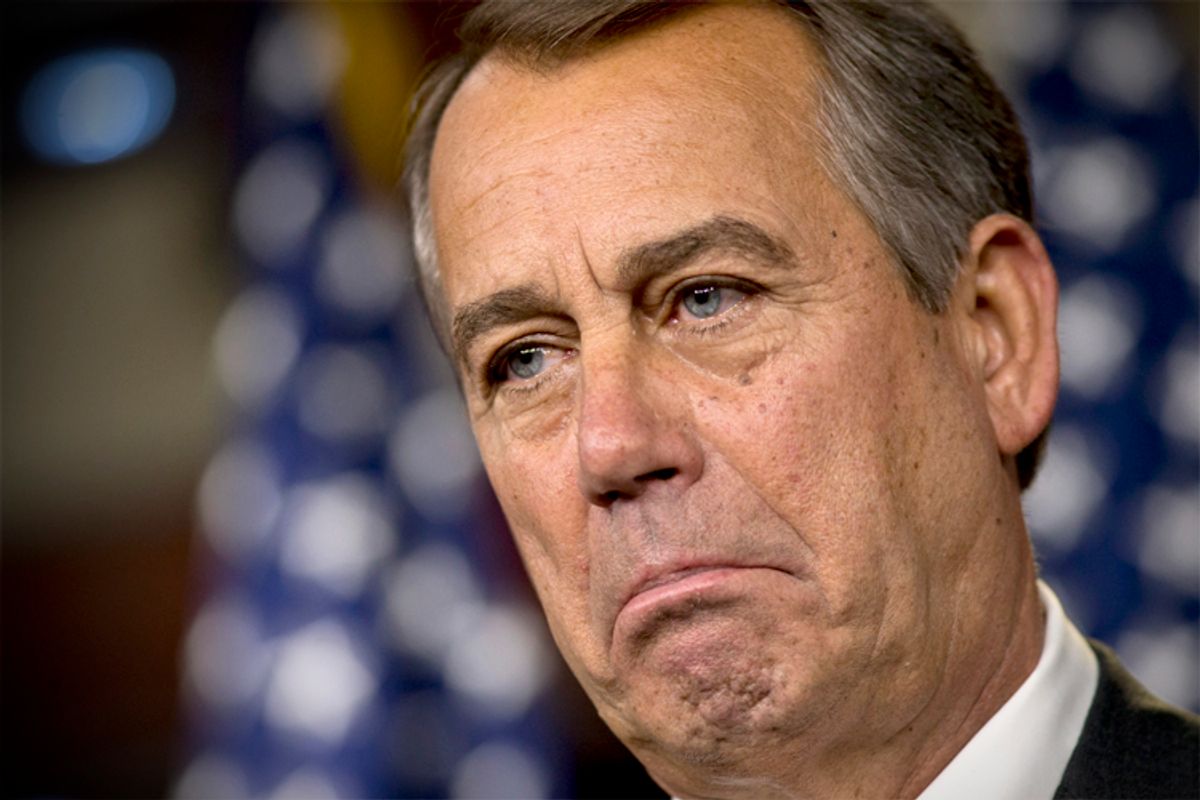In less than 12 hours, the federal government will run out of money. The fiscal year ends tonight at midnight and Congress has yet to pass legislation to extend its lapsing funds.
If you've come to know Congress as a lumbering behemoth that takes months to do what a more nimble institution could pull off in days, you might reasonably conclude that a shutdown of some length is at this point inevitable -- that even if Congress settled on an agreeable plan this afternoon, there wouldn't be enough time to pass it.
But that's not true, at least not in this case. There is ample time for the Senate and House to extend government spending before 12:00 a.m., and majorities in both chambers actually support a plan to do so, without making appropriations a vehicle for extraneous partisan policy demands, and without creating any further drama.
But still, a shutdown might happen. If it does, it will represent an admission by House Speaker John Boehner that the right wing of the Republican Party is too unruly for a person of his temperament to lead, and too powerful for a person of his character to ignore. He will be giving them the shutdown they demand, either to call their bluff, or to guard against being ousted from his speakership, or maybe a bit of both.
The dynamic is familiar -- it explains almost every other instance of congressional dysfunction over the past three years. Like the others, it's a failure that could have been prevented weeks earlier if internal GOP politics weren't so toxic. Except this story ends not with failure to pass an immigration reform bill or another genuinely contentious policy proposal, but with Republicans forcing the vast majority of government services to grind to a halt out of pique.
When President Obama won reelection, Boehner wisely attempted to address all of the contentious outstanding issues that he rightly understood would fuel dissent within GOP ranks. He called Obamacare the "law of the land," suggesting Republicans would dispense with their futile efforts to repeal or otherwise undermine it, and worked with Obama for about six weeks to craft a budget deal that would have turned shutdown fights, debt limit fights, sequestration and the fiscal cliff into first-term relics.
But he failed miserably.
He was nearly ousted by an attempted conservative coup on the first day of the 113th Congress. Republicans reframed sequestration as a huge conservative victory. And destroying Obamacare returned to the top of the GOP agenda, which meant that using shutdown and default threats to attack it became leading strategies once again.
This summer, a group of well-heeled, influential conservatives, and their standard-bearers on Capitol Hill, began pressuring Republicans to make new appropriations for the government contingent upon Obama agreeing to gut his own healthcare law. It's hard to say exactly what roles publicity, rudderless rage and strategic obliviousness played in this effort, but it was very obviously doomed from the outset to leave Republicans on the hook for a shutdown while holding Obamacare harmless.
But Boehner and other GOP leaders did almost nothing to extinguish the campaign and it quickly became a litmus test for dozens of conservative Republicans -- a minority of the party, but enough to threaten Boehner's leadership, and scare more sensible members of the party into believing their careers would be at risk if they moved too quickly to support a straightforward extension of funds for the government.
The question now is whether Boehner and his allies think walking to the brink is as much as they're willing to do to satisfy conservatives -- or whether they feel they have to allow a shutdown, however brief, to burnish their credibility and let the backlash sink in on the right.
We'll find out which door Boehner picks later today.



Shares